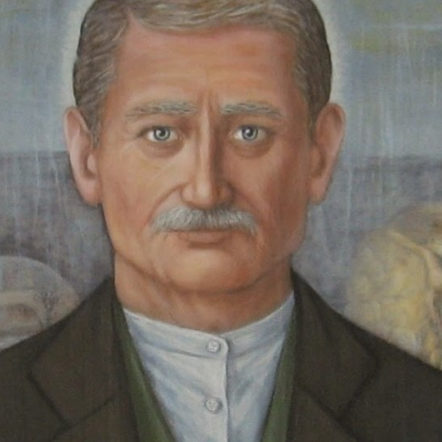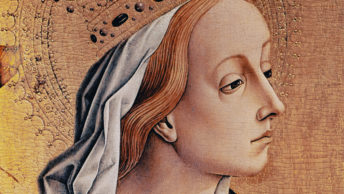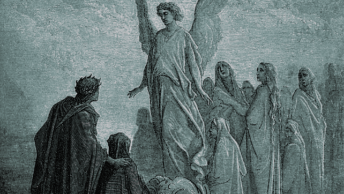In 1925, a 65-year-old man collapsed and died outside a Catholic church in Dublin, Ireland. Having on him only a prayer book and a rosary, no one knew who he was until his sister came and identified him. It was discovered that the deceased man was following the old Irish penitential practice of wearing heavy, uncomfortable chains beneath his clothes; when word of this got out, other people came forward to tell stories of his holiness and their personal encounters with him. The man was named Matt Talbot. Today he is considered the patron saint of recovering alcoholics; he has the title Venerable, and may one day be canonized a saint. He had been born to a very poor Irish family, and had to leave school and work in a brickyard at a young age. Matt had his first drink at the age of twelve, and soon was frequently coming home drunk. His father, himself a heavy drinker, beat Matt severely, but that didn’t change anything. Matt got by because he was a good worker at the brickyard, but like many hard-working laborers a century ago, he couldn’t control himself when it came to drinking—a condition not helped by the fact that weekly paychecks were given out in the local pub, where the men were easily tempted to spend all their wages on alcohol. Matt was so addicted he sometimes sold his boots or shirt to pay for a drink, and once he even cruelly and shamelessly stole a fiddle from a blind man who earned a meager living by playing his instrument on the sidewalk, hoping to collect coins from passers-by. From all indications, Matt Talbot was traveling down the broad and easy path that leads to eternal damnation.
One Saturday night, however, Matt was unable to buy a drink because he was broke, and none of his drinking buddies would lend him the money. Furious, Matt left in a huff, went home, and informed his mother he was going to take the pledge to stop drinking. Hoping this was true but not entirely convinced, she said, “Go in God’s Name, but don’t take the pledge unless you mean to keep it.” Fortunately, Matt really did mean it; he took the pledge in front of his parish priest, and from that day forward never had another drink, despite the tremors, nausea, and headaches caused by alcoholic withdrawal. In those days Alcoholics Anonymous and other Twelve Step programs didn’t exist, so Matt had to go it alone—but he wasn’t really alone, for he had God and a devotion to Mary to help him.
Until then, Matt had been a Catholic in name only, but after his conversion, he began attending daily Mass, and each morning prayed while kneeling on the steps outside for half-an-hour before the church opened; he also said the Rosary and the Stations of the Cross each day, gave much of his salary to the poor (even though he was still poor himself), slept on a plank instead of his bed as penance, did as much spiritual reading as he could with his limited education, and found a wise priest to serve as his spiritual director. As a reformed alcoholic, Matt Talbot lived the remainder of his life as a quiet saint on the streets of Dublin, helping others by his good example and practical concern (William J. Bausch Once Upon A Gospel, p. 243). He is a wonderful example of someone who, through God’s grace, found the narrow gate that leads to eternal life, and living proof that all of us—no matter what our problems or weaknesses—can do the same.
No one likes to talk about or hear of the possibility of eternal damnation—but Jesus doesn’t pull any punches on the subject. As He says in the Gospel, “Strive to enter through the narrow gate, for many, I tell you, will attempt to enter but will not be strong enough.” We might interpret His words as meaning large numbers of supposed Christians will smugly assume their “ticket is punched” and they’re on the way to Heaven, no matter what—only to discover to their horror that they’ll be on the outside looking in for all eternity. Fake Christians will wail and grind their teeth upon hearing the Lord say, “I do not know where you are from; depart from Me, you evildoers!” It’s precisely to prevent this from happening that the Letter to the Hebrews reminds us that God disciplines His children. One of the reasons bad or unpleasant things happen to us is that this may be the only way the Lord can get our attention, remind us of our absolute need for him, and motivate us to repent sincerely of our sins. God wants everyone to be saved, and the Book of the Prophet Isaiah describes how people from every nation will see His glory in Heaven—an idea Jesus echoes in the Gospel. This wonderful truth is very reassuring—but even so, we must not take salvation for granted or assume we can live by this world’s values and still make it to God’s Kingdom.
For much of the Church’s history people were afraid of God, terrified of His judgments, and worried about their prospects of making it to Heaven. Now the pendulum has swung too far in the other direction; there seems to be a widespread assumption that everyone, except for a few completely wicked people, immediately enters eternal glory after dying. I recently heard a speaker named John who said he had attended his cousin Vincent’s funeral; it was a beautiful Mass, he said, but the priest kept referring to the deceased—admittedly a good man—as Saint Vincent, as if he were certainly already in Heaven. John was upset, because for all he knew his cousin might be in purgatory—but the priest was in effect telling everyone it wasn’t necessary to pray for Vincent any more.
If salvation were easy and automatic, then when Jesus was asked “Lord, will only a few people be saved?,” He would have answered, “No, don’t worry; almost everyone makes it there.” He didn’t say that—so we must draw the necessary conclusions. First, as sinners, we are completely dependent on God’s mercy—and so we must be humble and honest in admitting our sins. Second, instead of being complacent, we must always strive to grow in holiness; coming closer to God must be our most important goal in this life. Third, we must be active members of the Church, relying on the Sacraments and our devotion to Mary and the other saints to strengthen us in facing life’s challenges and temptations. Fourth, we must pray for those who’ve died; if they’re in purgatory, they need our prayers, and if they’re not, God will apply our prayers to someone else. Lastly, we must not judge others—for as the example of Matt Talbot shows, God can create saints out of some highly unlikely candidates. As someone once observed, God wants to welcome us to Heaven, while the devil seeks to drag us down to hell; we will cast the deciding vote.








